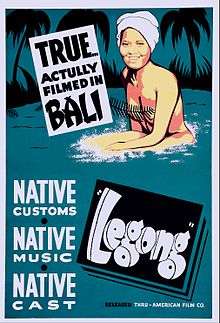Goona-goona epic
'Goona-goona epic' refers to a particular type of native-culture exploitation film set in remote parts of the Far East, Southeast Asia, Africa, South America, and the South Pacific. These include documentaries (often of questionable authenticity) and dramas, both of which rely heavily on travelogue and stock footage scenes (and sometimes fabricated scenes) of semi-nude native peoples performing exotic rituals and customs.

In Hollywood trade magazines "goona-goona" was a descriptive word for films or photos showing women of color with bare breasts,[1] usually in a supposed spirit of ethnographic interest like National Geographic.
The word goona-goona comes from the 1932 film Goona-Goona, An Authentic Melodrama of the Island of Bali by Andre Roosevelt and Armand Denis.[2] Supposedly "goona-goona" is an aphrodisiac or "love powder" made from a narcotic plant. In Indonesian, the word actually means a type of evil magic[3] or a love spell cast upon an unwilling victim.[4]
The word is used rarely today to mean sexually charged feelings or situations.
Films
- Gow the Head Hunter (1928)
- Caïn, aventures des mers exotiques (1930)
- The Blonde Captive (1931)
- Ingagi (1931)
- Virgins of Bali (1932)
- Wild Women of Borneo (1932)
- Goona-Goona (1932)
- Inyaah, The Jungle Goddess a.k.a. The Virgin of Sarawak (1934)[5]
- Ra-Mu (1934)
- Legong: Dance of the Virgins (1935)
- Jaws of the Jungle (1936)
- African Holiday (1937)
- Angkor a.k.a. Forbidden Adventure (1937)
- Black Magic a.k.a. Wajan (1937)
- Love Life of a Gorilla (1937)
- The Leopard Men of Africa (1940)
- Minta, Jungle Bride (1946)
- Curse of the Ubangi (1946)
- Devil Monster (1946)
- Ulama, White Sirens of Africa (1947)
- The Angry God (1948)
- Latuko (1952)
- Love Island (1952)
- Naked Amazon (1955)
- Mau Mau (1955)
- Liane, Jungle Goddess (1956)
- Naked Africa (1957)
See also
References
- Fatimah Tobing Rony, The third eye: race, cinema, and ethnographic spectacle, p. 145 et seq.
- Goona-Goona, An Authentic Melodrama of the Island of Bali TCM.com website describing the film.
- Rony, p. 148.
- Unni Wikan, Managing Turbulent Hearts, A Balinese Formula for Living (University of Chicago Press, 1990).
- https://catalog.afi.com/Catalog/moviedetails/6060